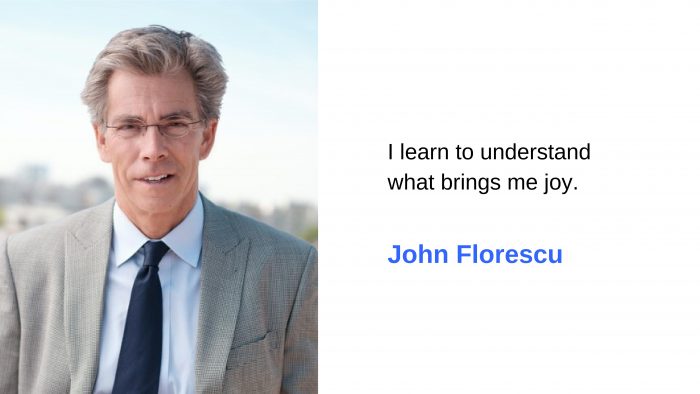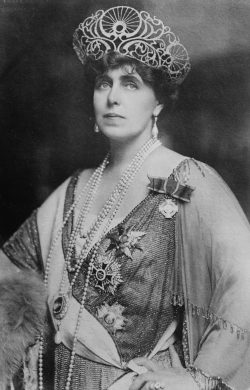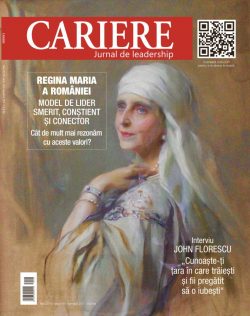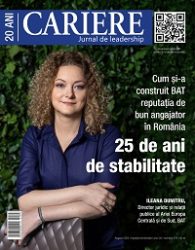John Florescu: Know the country you live in and be open to love it

In a world defined by change and globalization, it is important to know who you are and it is vital to know how to love. Your sense of self and your capacity for love will be a flawless compass, no matter the parts of the Globe or the parts of your soul you get to travel to.
John Florescu is the sum of the historian Radu Florescu and is descendant of an old noble family in Țara Românească. He has studies History, Politology, Philosophy and Economics at Boston College and at Oxford. For 17 years, John Florescu was President of „David Paradine Television Inc.” He has produced over 150 hours of TV shows for CBS, HBO, BBC, The History Channel, Discovery-Times, PBS, Disney. He has interviewed six US presidents, and two UK Prime-Ministers. Today, he runs the Romanian branch of Centrade – PR and Consultancy company. He founded Chainsaw Europe.
John Florescu has conducted an extensive interview with King Michael I of Romania and has produced the documentary ”King’s War” (2016) and the documentary „Queen Marie, the Heart of Romania” (2018).
His life and his profession have taken Mr. John Florescu to many such places. So we have invited him to share some of his experience and wisdom. Conversations like this are always a joy and a source of inspiration.
„I share what I have learned.”
Your family not only has a captivating history, but a fascinating present, as well. You live in different countries and continents, each with a different and strong upbringing, but an equally strong Romanian identity. Many Romanians are now raising their children abroad. Is there something you would like to share with them about how they can bring up their children with a healthy sense of self and of their identity, while also feeling fulfilled elsewhere in the world?
Know the country where you live and be open to love it. I think it is important for young kids to have in their mind a single home, a single predominant national identity, but with a clearly defined sense of ancestry. That is the way I was raised, and, frankly, the way most immigrants in the USA were raised. First we were American, and we were made of two core parts – Romanian and French. At Florescu family reunions, we heard all the accents of cousins coming from different nationalities: French, Italian, British, Texan, Swiss. They were foreign nationals first, but tied together by a pride and recognition of our Romanian roots.
I do not believe an “international” identity is healthy because a child has no primary connection to any particular nation – its church, language, history, music, food, countryside, holidays, sports teams, to cultural norms of TV, theater, art . These influences contribute to collectiveness and community necessary for development and peace of mind.
„Cynicism is an acquired condition, not an element of character.
No child is born cynical.”
We are aware of the challenges of being an immigrant. How about the gifts? I am sure this experience also enriches one immensely, opening their heart and mind to a comprehensive view of the world and its power of diversity. So what is it like to be a citizen of the world?
Even though I do not need a GPS to navigate the roads of NY, Paris, Bucharest, London, Los Angeles, Boston, etc, I do not see myself as a “citizen of the world.” I see myself as American, but broadly educated and widely exposed to the world. When we were small, the gifts of being an immigrant at school rested on the fact that we were different from the larger Irish and Italian groups of Boston.
We were “those Romanian kids” and people had a million questions, mostly friendly. Even my little brother, Radu, was called “Ragu” – a spaghetti sauce, with no meanness intended. People appreciated that we could play soccer (football) better than most because the kids played American football. My father wore dark glasses on his book-required TV appearances that intrigued people. Sounds crazy today, but being an immigrant was sort of cool. Everyone was. The little pieces that each contributes makes for a much better whole.
What would you say to the Romanian people to inspire them out of cynicism and add a little love to their irritation with the current state of affairs in our country?
Cynicism seems to come from the acceptance of so many so-called delivered “truths” that are essentially false. That is the case in Romania, but in many other parts of the world as well. An educated public has an intuitive good sense and can distinguishe between what is good and right, even while being bombarded with falsehoods.
A famous American writer and conservative politician, William F. Buckley, famously said he’d prefer to “be governed by the first 50 people from the phone book than the 50 of so-called brightest Americans.” Cynicism is an acquired condition, not an element of character. No child is born cynical. On politics, if you do not like how you feel about the choices, then change your vote.
You have interviewed His Majesty King Michael I of Romania. How did it feel like? Is there something meaningful you would like to share with us now about that experience?
I felt entirely at ease because he reminded me of my father. It was very enjoyable, because the King was a gentleman with grace, but also because he had clearly thought hard about his tumultuous life, and its sufferance – which made him interesting. He spoke openly and he laid out his disappointments about post communist Romania without hesitation. He had human qualities I admire, as well – kindness, non-pettiness, empathy for those of lesser bearing, sincerity, faith and humor.

What about Queen Mary. What did that experience feel like? what is the leadership (or another) takeaway you were left with.
Queen Maria felt like a discovery that would not end. The more I dug, the more I discovered. She was a hero in more ways that I imagined – highly opinionated, fearless, passionate, unconventional, provocative, crafty. We went to 9 countries and recorded more than 30 hours of interviews. All in all, we had spoken with 20 people over one year and a half. The Queen always thought big and acted as such, taking pain and risks along the way. She was a libertine, an independent thinker who often played well outside the rules of society, as only one who is at the top can afford to do.
„King Michael had human qualities I admire.
He reminded me of my father.”
The current global dynamic is highly charged and interesting. It seems `hidden symptoms` have now surfaced and need to be dealt with. You have spent time with and spoken to many important leaders of the modern world. What kind of leadership do you think is needed to tackle this dynamic? What would be a good approach to appease the situation?
I have talked about this before, but John Kennedy said it well in his 1961 inauguration speech in Washington DC, when he assumed the Presidency. He challenged Americans: “Ask not what your country can do for you. Ask what you can do for your country.” The government is here to serve the people. And the people owe something back for the gift of being an American.
I have also had the opportunity to produce interviews with many world leaders. I am often asked, “Who impressed you the most?” I’d say the late British Prime Minister Margaret Thatcher, the first woman PM, whom I had met on four occasions in small settings. I observed her closely: One, she believed what she said. Two, she expressed herself simply and forcefully. Three, she wanted to convince YOU of the rightness of her cause. She wanted to bring you with her.
What brings you joy? How do you keep your thinking fresh?
Friends, family and work. Every year, I look back on the year and write down the 5 things I will never forget about the year gone by. I learn to understand what brings me joy. I think about it. it could be a trip, a beautiful moment, a hilarious situation, a singular gesture by someone, even a moment of sadness – like a death of someone close. But it almost always involves people and it’s often an “out of the box” experience. One keeps the mind fresh by reading, meeting new people, traveling and thinking hard about how that combined experience intersects with ones life (at any stage you are at). Nelson Mandela gave some good advice, “Where ever you are in life, there is always a road ahead.”
Are you the person you needed when you were young?
Pretty much. I listen, I have knowledge, and life experience. I share what I have learned and point out what I think are the good paths versus the paths to avoid. I tend to judge, often too quickly, and that is probably not the “quality “ that I would have sought in a mentor when I was younger.
„I have more Romanians here than any other nationality.”
(Bill Gates)
From among your projects, do you have a favorite one – one that may have touched you or taught you something that you would like to share with us?
For almost a decade I have taken my two older sons (22, 18) each year on a super fast trip (6 days) to a far-off place they have never visited (and probably never will). Not till the check-in, do they know where they are going (to keep the mystery clothes for cold, clothes for hot required). I do these trips to keep close to my children, when gadgets and other distractions pull them away.
I shut out the world I know to the world I don’t. I disconnect from the interruptions that get in the way of clear thinking. I see something very, very new, often with a historical twist (like the 50th anniversary of the bombing of Hiroshima by the United States).
How does your love for Romania show up?
By defending it, particularly when I am out of the country (and often more than I think it deserves!) I remember meeting Bill Gates, founder of Microsoft and then the wealthiest man in the world at his “campus” on the West coast of the USA. Following the introduction, Gates said, “Are you Romanian?” I said „Yes, by background”. And he said with a smile, “I have more Romanians here than any other nationality. So many that I have three huge cafeterias just with Romanian cooks!” That made me feel great. One other thing: no one is kinder to little kids than Romanians.
For the Romanian version of this interview, please click here.

This interview is also available in Romanian, in Revista CARIERE – 257 / May, 2019. To subscribe, click HERE.

